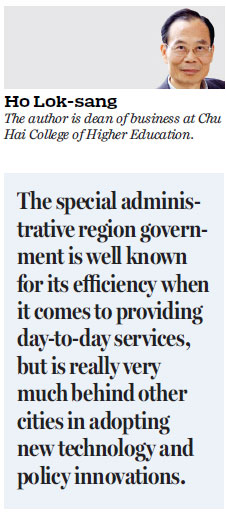HK should regulate sharing economy
Updated: 2018-07-31 06:56
(HK Edition)
|
|||||||
Ho Lok-sang argues that the SAR government needs to play a role in controlling businesses such as Uber to reduce some of the risks and problems they bring
The "sharing economy" has offered promises of greater efficiency and better livelihoods for many. Unfortunately there are often risks and problems, and, without a more active role on the part of the government, there is no assurance that promises for a better tomorrow will result from the development of the sharing economy.
The idea of sharing economy is to draw on any spare capacity of facilities that people may have in order to meet the needs of consumers to achieve a "win-win" situation. Owners of the facilities would get an income. Consumers of these services would have the use of these facilities which otherwise might stay idle. The advent of the sharing economy is disruptive to existing market participants. For example, the arrival of Airbnb and things like it immediately creates competition for traditional hotels. Operators of these hotels have to realize they are now working in an altogether different environment. The world has changed.

But the idea of sharing economy is not only causing problems for existing market players. It is causing many problems to some communities and neighborhoods. Moreover, some so-called sharing economy operators are not genuine operators. For example, all of the bike-sharing startups do not use existing bicycles but have to invest in their own fleet of bikes. In practice, users of the bikes do not handle them properly. Vandalism is rampant. In a few neighborhoods, bikes from these startups are taking up much public space, to the extent that they have become a public nuisance. Because of the high rates of damage and cost of repairs, plus intense competition, most of these startups are suffering big losses. Gobee.bike was recently forced to shut down operations in Hong Kong.
Another sharing economy company in the news recently is Uber. Some 28 Uber drivers were convicted recently of providing riding services without a license. They had previously denied the charges. These convictions are on top of one who had pleaded guilty earlier. Each was fined HK$3,000 to HK$4,500. The magistrate noted that while the convictions are unavoidable under existing laws, policymakers need to confront the issue brought about by modern technology.
As early as 2014, taxi drivers had staged a slow-drive protest in Central against the Uber "invasion". Their discontent is understandable. If they are not taxi owners they have to pay about HK$400 per shift and they must have a taxi driver's license. Uber drivers do not need to pay such rental costs and only need to have a driver's license and a hire car permit. Uber drivers typically drive their own cars, although some may drive other people's - with or without them knowing it. They directly compete with taxis for business. Up to now the government has not indicated it would consider bringing in the necessary regulations to legalize their services. One could ask: If Singapore finds Uber acceptable with regulations, why can't Hong Kong?
We may recall that former secretary for commerce and economic development Gregory So Kam-leung expressed support for amending relevant laws in Hong Kong to accommodate Uber. It is true that Hong Kong's roads are heavily congested; this is one of the key reasons why the government has not issued new medallions for urban taxis since 1994. It is imperative for regulations to be in place to control the number of vehicles, especially those that are on the road working almost "full time" each day. There is also an important need for fair play.
One simple model to do this is to devise a revenue sharing formula, and impose regulations on driver qualifications. For convenience we can just call it a tax on revenue. In principle, the tax rate can be raised high enough to deter excessive "sharing economy vehicles" on the road. The tax will also effectively serve to offset the unfair advantage to taxi drivers. The tax can also be justified because administering the extra regulations is costly to the government. The company should also be required to file a report each quarter with the Transport Department, so the Transport Department can keep abreast with statistics necessary for sound regulations.
The government has traditionally adopted a laissez faire approach to economic policy. But it really needs to be more proactive today. It has to closely watch out for new developments in technology which are affecting both traditional businesses and the role of regulators. How else can Hong Kong cope with the increasing threats to cyber security and financial market stability, and take advantage of the opportunities created by modern technology? The special administrative region government is well known for its efficiency when it comes to providing day-to-day services, but is really very much behind other cities in adopting new technology and policy innovations. Part of this has to do with our democratic culture and the need for public consultations for almost every policy initiative. But much of it has to do with a culture of preferring to be a follower rather than a leader of innovations.
(HK Edition 07/31/2018 page8)